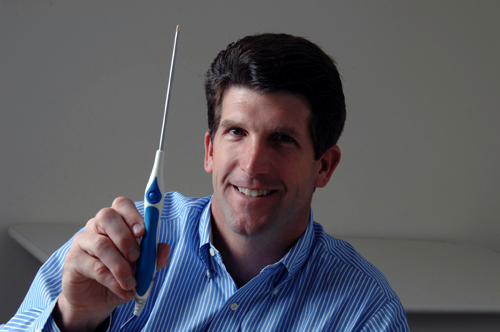
The founders of NuOrtho Surgical Inc. picked what would seem to have been an inauspicious month to get a new company off the ground: September 2008, the same month Lehman Brothers’ bankruptcy touched off a global financial crisis.
Yet despite setting up shop in the midst of one of the most harrowing periods in American economic history, NuOrtho has managed to thrive, raising $2.8 million from investors over the last year and a half. The Fall River medical-device company has now submitted its first product to the U.S. Food and Drug Administration for review.
If anything, the recent economic turmoil has made CEO Jeffrey Morrill even more gung-ho. “We think it’s a great time to be building a company,” he said – and, crucially, he has managed to convince his financial backers of the same thing.
Morrill is not alone. Since last fall, 10 local technology companies raised a total of nearly $46 million from investors, according to research by Providence Business News. An 11th firm, BLI Messaging of Providence, did not disclose how much it raised.
Investors provided the new financing despite continued concerns about the strength of the economic recovery. In May alone, two small firms – East Greenwich-based DiJiPOP LLC and Cranston-based DormNoise LLC – raised $840,000 and $500,000, respectively, while Providence entrepreneur Angus Davis’ high-profile startup Swipley Inc. closed on a $7.5 million Series A round.
“I think that what we’re ending up with is companies that are getting smarter about how to find financing,” said Allan Tear, a consultant and managing partner at Betaspring, a Providence startup incubator now in its second year. “We have a new cadre of CEOs who sort of understand our post-2008 reality. They know what the new rules are around how to run a lightweight company that’s still going to grow big, and they’re able to go and deliver that message to investors.”
The trend encompasses a wide range of businesses and dollar figures.
NABsys Inc., which is developing a new approach to DNA sequencing, closed in February on a $7 million Series B round that led Raymond S. Stata, founder and chairman of the Fortune 1,000 semiconductor firm Analog Devices Inc., to join its board.
Isis Biopolymer Inc., a Providence medical-device firm, received $3 million in March from 26 repeat investors to fund clinical trials, manufacturing and research and development. The company has developed the IsisIQ, a programmable, multidose drug patch resembling a Band-Aid that delivers drug treatments.
Among smaller firms, DormNoise has an interesting story to tell. The company, which markets an interactive calendar system for college students, was founded in 2007 by Jay Rodrigues, a Cranston native who is now a 21-year-old junior at the University of Pennsylvania.
DormNoise’s $500,000 Series A investment came from DN Ventures, a group of angel investors, and Present e-Learning Systems Inc., an educational software company in Florida. Alan Jacober, a managing partner of DN Ventures, said the company’s “momentum and visionary roadmap impressed us.”
At NuOrtho Surgical, the company is eagerly awaiting the FDA’s eventual decision on its Ceruleau orthopedic probe, which is designed to remove damaged cartilage and preserve healthy tissue during surgery. Morrill said he saw the financial crisis scare many investors and make them more exacting.
“I think professional investors and educated ones just committed to a new level of due diligence, so they wanted to see more depth in … our business plan, or science, or our IT portfolio,” he said. A side benefit, he added, was that the investors who took a look at the company offered valuable constructive criticism.
NuOrtho’s investors liked that the company had a seasoned team of executives in place and that its business plan included a number of teams over its first three to five years when they could potentially see a return on their investment. They also liked the company’s frugality – it operates out of a suite inside the University of Massachusetts Dartmouth’s Advanced Technology & Manufacturing Center.
Local companies are reaping the benefits of “a substantially better year for startup fundraising,” just as their peers are nationwide, said Lee Hower, a venture partner at the Providence firm Point Judith Capital who has invested personally in Swipely and, on behalf of Point Judtih, in NABsys.
Betaspring’s Tear said he is seeing local companies embrace the same ethos that has become prevalent in startup havens like Silicon Valley and Cambridge, which is to use a minimal amount of initial funding to create and launch a prototype product, the success of which can be used to win over investors.
“I think we’re entering into a good place where we’re getting more companies that are able to start small but are able to scale fast, and that’s something we need,” Tear said. NABsys and Isis, for example, were able to show results with smaller amounts of money, which made it easier for them to go back for more in recent months, he said.
One of the companies Tear helped guide through Betaspring last year was DiJiPOP, which has developed a digital advertising platform for manufacturers. Ji Kim, the company’s co-founder, said building the product and proving that customers wanted it made it easier to convince investors to sink money into the firm.
Kim and his business partner, angel investor Bill Cesare, have met with about 40 venture capitalists over the past seven months. Many were nervous about Kim’s lack of experience as an entrepreneur. He also found that for many investors, “early stage” meant being ready to grow or already having revenue, as opposed to just having a good idea. The pair relied on individual investors to put together their $840,000 last month.
“What’s beautiful about finding individual investors is they’re really investing in the people,” he said. “They really want to feel comfortable with that person, whereas VCs and institutions are just looking for numbers.” •










